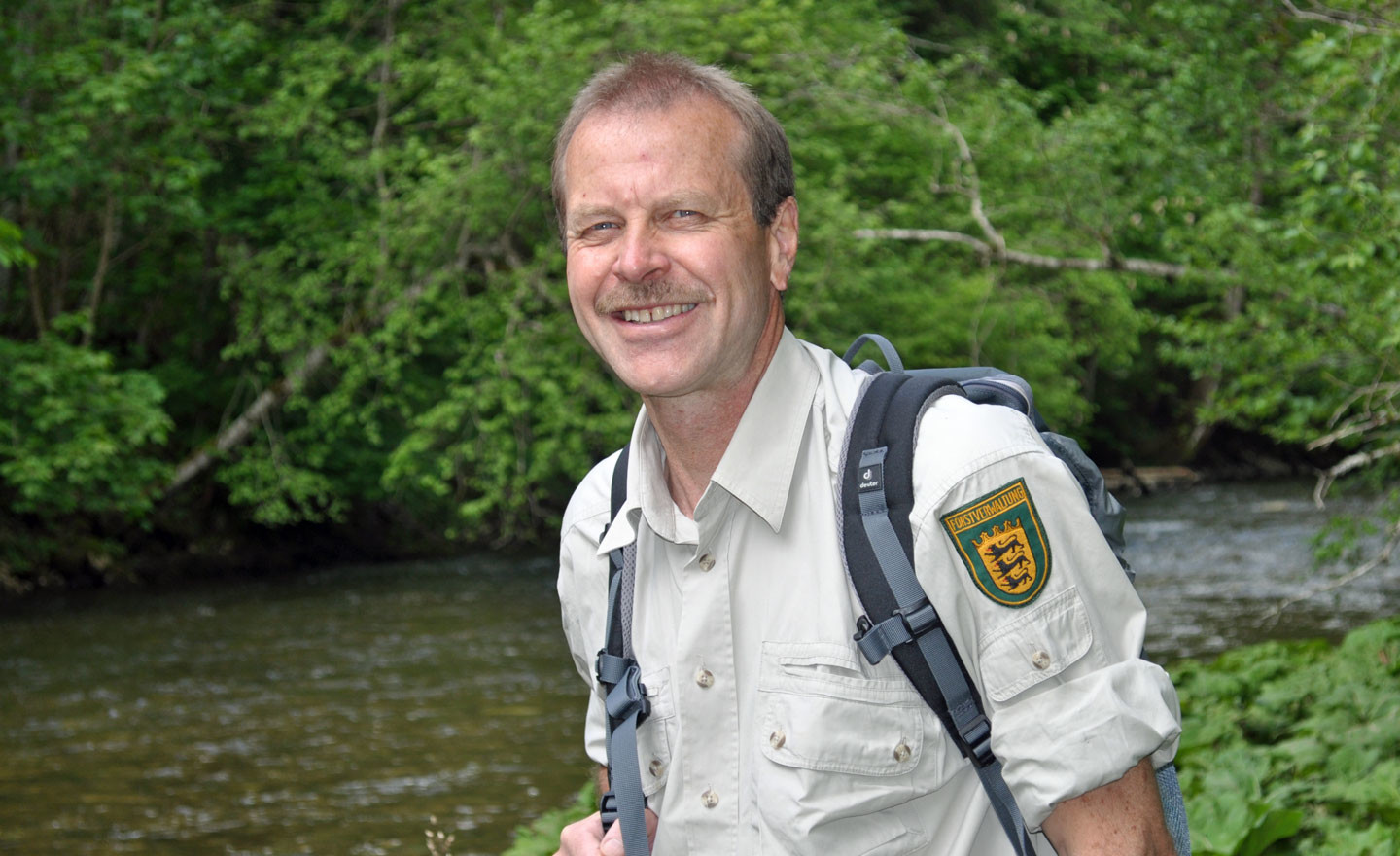
Martin Schwenninger
Born in Bonndorf in 1957, he has been the Wutach Ranger since 2004. And, of course, he knows the area like the back of his hand. His place of work: the Wutach Gorge, with its romantic gorges and primeval forests.
I am happy when people are interested in nature and enjoy being outdoors.
Martin Schwenninger
To address two common misconceptions right away, a ranger is not only out and about, but has office work to do as well. Of course, they take care of nature, but there are always decisions to be made based on different goals and depending on the area. Take, for example, the adventurous, unspoilt Wutach Gorge in the south of the Black Forest holiday region. If the forest were to take over completely, there would no longer be the typical high meadows, whose nettles, aconite, and butterbur leaves which act as important habitats for moths, beetles, and spiders. "I find the decisions about which natural areas to prioritise a very exciting part of my job,” says Martin Schwenninger.

Martin Schwenninger stands in the Wutach Gorge and looks at the river – © Klaus Steegmüller
Born in Bonndorf in 1957, he has been the Wutach Ranger since 2004. And, of course, he knows the area like the back of his hand. But, many years and work far from home have also shaped him; he left the region at 15, working as a forester and in the forestry administration in Baden-Württemberg and spent 2.5 years in West Africa in addition to many other trips. "I have always been interested in how other countries think about and deal with nature conservation. Compared to France and Spain, Germany is very densely populated, so natural areas cannot be entirely closed off." In the year of Coronavirus, this also has negative effects. Schwenninger assumes this interest in nature will continue. "In principle, we rangers and nature conservationists are happy when people are interested in nature and enjoy being out in it," he says. "But, when there is too much traffic and too many people straying from the paths in protected areas, we must take countermeasures."
When the forest calls
Nature as a profession
The tasks of Schwenninger and his colleagues also include "directing" the flow of visitors by means of signs, tweets (@Wutachranger), hiking maps, tips, news on route closures, and more. However, it is also essential to talk to hikers, holiday makers or family groups, answer questions, and advise against possible misconduct. "Many people are very understanding and only walk away from the paths by mistake," says Schwenninger. "For us, it is mainly about instilling in people an appreciation of nature and a sense of nature conservation practices. For example, if visitors go to the gravel islands typical of the Wutach Gorge, the kingfisher no longer flies and breeds there. You need to know that the kingfisher is a shy animal, and it is therefore unlikely that you will see it at all." The key, says Schwenninger, is to experience nature with respect. An overview of the most important rules can be found at www.respekt-schwarzwald.info


A view into the wildly romantic gorge with its plunging water fountains – © Martin Schwenninger
Wild and romantic
The Wutach Gorge
Schwenninger likes to show the fascinating Wutach Gorge with its romantic ravines and primeval forests during his guided tours. He finds it particularly exciting to ask visitors why they enjoy being out and about, so that he can tailor the information he passes on to them. In spring and summer weekends, he can often be found out in the field, whereas the winter months are mostly spent doing office work, setting new priorities for the upcoming year’s tours, updating print materials and the website, and on everyday administrative work. "Overall, I probably work 50% outside and 50% in the office."
In his free time, naturally, he often prefers to travel outside of the Wutach Gorge. "Otherwise, you never switch off," he laughs. “A classic problem of all rangers!” He likes to be out and about with his camera. He is particularly interested in the relationship between nature and the animal kingdom. "You need time to take a good picture, because the bird doesn't fly by at the click of a button, and only those who walk attentively and slowly may spot a beaver." And Schwenninger, a keen cyclist, can probably be described as a person with similar attributes; at peace with himself, focussed, approachable, thinking outside the box. More info at www.wutachschlucht.de
Text: Michael Gilg
Publication: 2021
Pictures: Martin Schwenninger, Klaus Steegmüller
{{=it.label.text}}
{{=it.label.author}}
